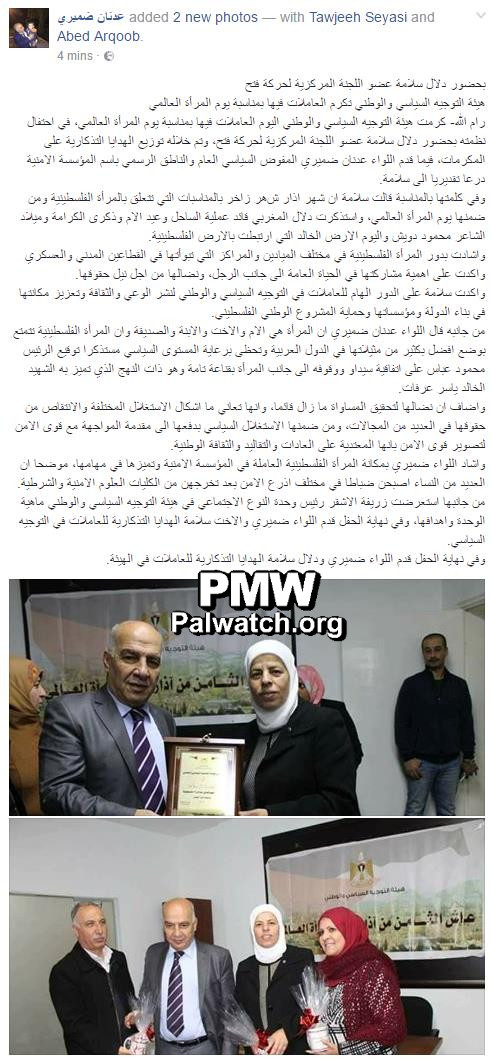Fatah official mentions Dalal Mughrabi as exemplary woman at International Women’s Day event
 Images and text posted on the Facebook page of PA Security Forces Spokesman Adnan Al-Damiri
Images and text posted on the Facebook page of PA Security Forces Spokesman Adnan Al-DamiriPosted text: “The [PLO] Political and National Guidance Authority honored its female employees for International Women’s Day, in a ceremony that it held in the presence of Fatah Movement Central Committee member [and Fatah Commissioner of NGOs] Dalal Salameh…
General Political Commissioner [of the Political and National Guidance Authority] and official spokesman of the security establishment (i.e., the PA Security Forces) Adnan Al-Damiri presented Salameh with a plaque of appreciation.
In her speech for the event, Salameh said that the month of March is full of events connected to Palestinian women, including International Women’s Day. She mentioned Dalal Mughrabi (i.e., terrorist who led murder of 37, 12 of them children) - commander of the coast operation (i.e., the Coastal Road massacre), Mother’s Day, the Karameh [Battle] anniversary, the birthday of poet Mahmoud Darwish, and the eternal Land Day.”
Dalal Mughrabi led the most lethal terror attack in Israel’s history, known as the Coastal Road massacre, in 1978, when she and other Fatah terrorists hijacked a bus on Israel's Coastal Highway, murdering 37 civilians, 12 of them children, and wounding over 70.
The Karameh battle, or Al-Karameh - On March 21, 1968, Israeli army forces attacked the town of Karameh in Jordan, where Fatah terrorists had been launching attacks on Israel. Although Israel prevailed militarily, Arafat used the event for propaganda purposes, declaring the battle a great victory that erased the disgrace of the 1967 Six Day War defeat.
Mahmoud Darwish is considered the Palestinian national poet. He published over 30 volumes of poetry and 8 books of prose and has won numerous awards. He joined the Israeli Communist Party in 1961 and the terrorist organization PLO in 1973, becoming a member of the PLO Executive Committee in 1987. He left the PLO in 1993 because it signed the Oslo Accords with Israel.
Many in Israel see his poetry as inciting hate and violence. One poem he wrote in 1988 at the height of the Palestinian wave of violence and terror against Israel (the first Intifada, 1987-1993) calls to Israelis: “Take your portion of our blood - and be gone… Live wherever you like, but do not live among us… Die wherever you like, but do not die among us… Leave our country, our land, our sea, our wheat, our salt, our wounds, everything, and leave the memories of memory.”
He also wrote “Silence for the Sake of Gaza” in 1973, which many see as glorifying terror: “She wraps explosives around her waist and blows herself up. It is not a death, and not a suicide. It is Gaza's way of declaring she is worthy of life.”
His defenders have claimed that Israel misinterprets his poetry and that he sought reconciliation with Israel. One wrote in 2017: “Darwish arranged meetings between Palestinian and Israeli intellectuals, and published essays on their discussions. He was optimistic that, through mutual understanding, the two sides could eventually reconcile.” [https://www.bcalnoor.org/]